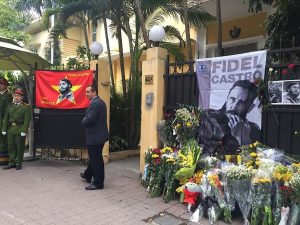On November 30th, I walked into the historic building housing the Cuban Embassy in Hanoi, Vietnam. It was getting cold and it was drizzling. Several Vietnamese guards stood silently at the entrance. Flowers were everywhere and a big black photo of Comandante Fidel was facing a busy street.
I explained who I was, and an embassy official first let me into a courtyard decorated with more flowers and images, and later into a room with a beautiful book, into which I penned several sentences of grief, but also admiration and hope.
“People come day and night,” Cuban officials told me. “It is beautiful and humbling. Vietnam and Cuba stood shoulder to shoulder for decades. We went through so much. Now we are being shown what true friendship means!”
 Author Writing Tribute to Fidel at Cuban Embassy in Hanoi
Author Writing Tribute to Fidel at Cuban Embassy in Hanoi
As if it was their national hero who had departed, Vietnam declared December 4th a National Day of Mourning. All Vietnamese flags, at home and abroad, were to fly at half-mast. All music, all performances have been cancelled for that day, and no alcohol will be allowed to be served.
For days now, Vietnamese television has been showing documentary films about Fidel and about the Cuban Revolution.
“Cuban people are ready to spill blood for Vietnam,” Fidel Castro Ruz declared in his memorable speech, during the war. Several decades later, when Cuba was abandoned and stood alone, it was China, which rushed to its rescue, and it was Vietnam that extended its hand of friendship.
Such things can never be forgotten, and never will be forgotten. It is because precisely from such moments, true internationalism is made!
No matter what crescendo the Cold War was reaching, and even when, for some unfortunate time Soviet Union and China were facing each other as enemies, Fidel’s Cuba was working with both Communist giants for the liberation of Africa, particularly during “Che” Guevara’s campaign in the Congo.
In the end, it was both Cuba and North Korea (DPRK) that fought for and helped to liberate the most oppressed and devastated continent on our Planet – Africa. The imperialist United States and Europe never forgave these two countries for their internationalist stand. To demonize them, to destroy them by all imaginable and unimaginable means, to push them into the dark corner was what they have been attempting to do for several decades, with mixed success.
As reported by The Independent:
North Korea is observing a three-day mourning period for late Cuban leader Fidel Castro, who was seen by the North as a comrade-in-arms against the United States.
The North ordered flags outside official buildings to be flown at half-mast as a mark of respect for Mr Castro, who died on Friday at the age of 90.
In the Pyongyang subway, commuters in one station crowded around a glass case containing a obituary to Mr Castro published by the ruling party newspaper, Rodong Sinmun.
Alongside a picture framed with a black border and showing a head-and-shoulder shot of a bearded Mr Castro in full military dress, the obit recalled his visit to North Korea in 1986 when he met founder-leader Kim Il-sung.
It noted the Cuban leader was awarded the title of “DPRK [North Korea] Hero” for his efforts to strengthen relations between two countries “fighting in the outposts of the anti-US, anti-imperialist struggle.
Cuba may be in Latin America, but in its heart it is daringly internationalist. Its fate is intertwined with Africa and with Asia.
After the Soviet Union collapsed and everything seemed to be lost, after virtually all East European countries betrayed the cause and opportunistically joined the world’s oppressors and imperialists (not even bothering to honor their trade and other agreements with Cuba, North Korea and Vietnam), China single-handedly saved Cuba. It is not a well-known fact, and definitely something that is not discussed often in the ‘polite circles of ‘benign’ Western left’, but it is an undeniable historical fact, often mentioned by Fidel himself.
China did it, altruistically, following Gorbachev’s fit of madness and Yeltsin’s Western-encouraged glorified alcoholic orgy, with the destruction of the USSR and several dreadful years of the unopposed plunder of the world by the Western Empire, in its aftermath.
The Chinese people, Chinese government, its intellectuals and media commemorated the departure of Fidel with powerful speeches, documentary films and events to honor the exceptional life of one of the greatest revolutionaries of all times. China’s press agency Xinhua reported:
“Chinese President Xi Jinping said Saturday that history and people will remember Fidel Castro, calling the Cuban revolutionary leader “a great figure of our times.
Fidel Castro, founder of the Communist Party of Cuba and Cuba’s socialist cause, was a great leader of the Cuban people, Xi said, adding that he has made immortal historic contributions and devoted all his life to the Cuban people’s great cause of struggling for national liberation, safeguarding state sovereignty and building socialism.
“The late Cuban leader has also made immortal historic contributions to the world socialist development,” Xi added.
“The death of Fidel Castro has made the Chinese people lose a close comrade and sincere friend. His glorious image and great achievements will go down in history,” Xi said.
President Xi then concluded: “The Chinese people have lost a good and true comrade. Comrade Castro will live forever.””
Reading such reports, I grasped how genuine they are. I know intimately both countries, Cuba and China. I realize how much Cuba admires China and how much Chinese people hold Cuba in esteem.
In 2013, I spent several days in Cuba with one of my best friends, a celebrated Chinese concert pianist Yuan Sheng. He flew in to Havana all the way from Beijing, in order to participate in a festival of some of the best pianists from all over the world; the festival was organized by his former professor from the Manhattan School of Music, the legendary Solomon Gadles Mikowsky, himself originally from Cuba.
The Cuban people treated him with great warmth, and all doors were opened to him. Before he departed, he explained:
I am tremendously impressed by the cultural life and art scene in Cuba. I traveled to and performed in so many countries in North America, Europe, Africa and Asia… But what I see here is unprecedented. Music, ballet, arts… Even the art objects that people sell on the street… It all shows how heroic the national character of Cuban people is.
Cuba is also very open-minded and receptive of international culture; there is a constant interchange with the world. The plane, which I took here was bringing an entire delegation of Chinese artists and performers. And that is at the same time as I was coming to take part in yet another festival, which was featuring top international pianists. Coming here, I am helping to deepen the understanding between China and Cuba. And you know, in the last years, many educated Chinese people are fascinated with this island and its artists. When I was talking to my friends back in Beijing, that I am going to Cuba, their eyes widened. They were envious, they kept telling me how lucky I am. They wanted to know, to understand Cuba.
Fidel’s Cuba is not only synonymous with excellent medical care, education, social programs and the determined fight against the Western imperialism. It is itself also one tremendous symbol of cultural and artistic excellence and openness. Cuba gave birth to, and educated, some of the world’s greatest artists. Cuba is also deeply respectful of other world cultures. Its people are obsessed with knowledge and are respectful of how others see and perceive the world.
Observed from Havana, Asia is just there, almost next door!
*****
Before Fidel passed away, President Duterte of the Philippines sent his Health Secretary to Cuba to look at its health care system.
Even such staunch anti-Communist ‘warriors’ and client states of the West like Indonesia (where the Communist Party and Communist ideology are banned) at least showed some polite respect, sending condolences to Havana:
The government and the people of Indonesia send our deepest condolences for the passing of former President Fidel Castro. May he rest in peace and the people of Cuba be given strength to endure his passing.
“… Be given strength” by whom? But let’s not dwell on the details.
In India, even under the rule of Prime Minister Modi, Fidel is still alive; alive and well.
Binu Mathew, the editor of the most important left-wing site on the Sub-Continent, Coutercurrents.org sent his thoughts for this essay:
For Indians and especially for Indian communists, Fidel Castro was a fellow Indian and a comrade. India grieved at his passing. All Indian media covered his passing in a major way.
When Cuba went through a major crisis after the fall of Soviet Union, Indians did a door to door collection of rice and wheat and sent to Cuba 10,000 tons of rice and 10,000 tons of wheat.
India was one of the first countries to recognize the revolutionary Republic of Cuba.
Cuba and Kerala where communists came to power through elections for the first time ever in the world had similar development visions. Both didn’t go after major industrialization but invested in education and health. Both set a new people-centric paradigm of development.
Fidel was a pillar of the Non-Aligned Movement which was co-founded by India’s first Prime Minister Jawaharlal Nehru. The camaraderie between them was famous. They first met in 1960 NAM summit.
Castro narrated his experience in a media interview: “The first person who came to see me was Prime Minister Nehru. I can never forget his magnificent gesture. I was 34 years of age, not widely known. I was tense. Nehru boosted my morale. My tension disappeared.””
This alone could be a powerful tribute from Asia.
The two mightiest countries on the continent, China and India, are mourning. So are hundreds of millions of people in Vietnam, the DPRK, and the Russian Pacific Region, even in the tiny nations like Timor Leste.
In all Communist countries and regions of Asia, Fidel is regarded almost as a local hero and leader. In pro-Western, staunchly business-oriented societies, he is viewed as a threat, even after his departure.
He is respected, however, by both sides; respected for his honor and courage, and for fighting battles that almost no one else would dare to fight. Such valor is highly regarded in Asia.
Since ancient days in this continent, important thinkers and those who fight for the good of humanity are valued incomparably higher than rich merchants and traders. Honesty is essential. Traitors are not valued much higher than scum. At some point in history, they may be ruling over their nations, but when they ascend to the throne, they start counting, as their days are always numbered.
True heroes like Fidel live forever, in the legends and songs, in hearts and dreams for a much better world.
Asia remembers. It mourns the great Cuban hero, a great African hero and an Asian hero, an internationalist, Fidel Castro.
• First published by RT











